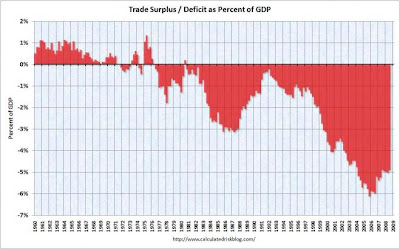From Forbes, Nathan Lewis suggests the gold standard didn’t keep the trade deficit down. This chart seems to counter Lewis’s analysis:
At Forbes, Bill Flax argues the recovery is stalled by unsound money.
The WSJ critiques the President’s job proposal. Stephen Moore comments on the plan. In NRO, Larry Kudlow adds his two cents.
On The Kudlow Report, David Malpass discusses Greece:
At Forbes, Peter Ferrara defends Reaganomics.
From National Review in November 1980, the late, great Robert D. Novak describes the challenges facing the newly-elected Reagan Administration, including cutting tax rates, restoring a gold standard, and fighting off Republican austerity advocates.
In The WSJ, James Grant reviews a book on economists.
Also in The WSJ, Cato’s Daniel Ikenson advocates lowering tariffs on imported raw materials.
As important as access to foreign markets is, however, some of the most significant obstacles to U.S. export success aren’t foreign-made but homegrown. If the president is genuinely committed to spurring economic growth and job creation, he will take the lead on reducing or eliminating duties that U.S. producers pay on imported raw materials and components they need for manufacturing. This would instantly boost the competitiveness of U.S. products at home and abroad.
From Heritage, Curtis Dubay sets the record straight on the effects on growth of the Clinton tax hikes and the Bush tax cuts.
IHS features George Mason’s Don Boudreaux explaining free trade:
The Tax Foundation’s William McBride analyzes the true level of taxes paid by corporations.
At Forbes, Charles Kadlec notes the high jobless rate among African Americans.

